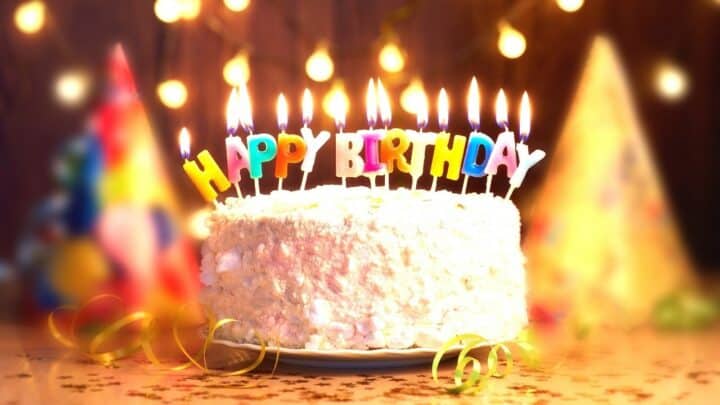Have you ever taken a pause while writing utterly ordinary phrases to contemplate whether or not a comma should be shoved in?
And, have you ever deliberately consulted Dr. Google for these types of writing concerns?
One such phrase that often causes trouble is the well-known “Happy birthday phrase.”
People seem to be confused about whether “Happy birthday” should be followed by a comma or not.
So, in case you have been wondering about this exact problem, then please read on!
Do we need a comma after “Happy birthday?”
Generally, yes, we do need a comma after writing or typing “Happy birthday” when the message is directly intended for a specific person, a pet, a plant, and so on. This is what we call a “direct address” wherein we talk directly “toward” a person, as opposed to only talking “about” a person in the written language. However, we do not place a post-comma when the phrase is followed by “to you” instead of an addressee’s name.
What is a direct address?
A direct address isn’t those words that we put when filling out the address tabs in creating an account for an online shop.
Put simply, it is not the information that contains our house number, street name, apartment number, city and state names, and zip code.
Instead, a direct address, also grammatically known as the vocative case, is a way of representing oral speech in writing that is intended for an addressee.
A direct address may come in the form of names, endearments, and titles of people, but they are not limited to these alone, of course.
In fact, humans may also communicate with animals, plants, and inanimate beings which also necessitates the use of a direct address when represented in writing.
Apparently, a conversation needs at least two entities to occur, but it doesn’t mean that the other party should be able to proactively respond.
To some extent, seeing people talking to their pets, plants, cars, or even to themselves restores my faith in humanity, so to speak.
One of the main purposes of the written language is to imitate oral speech in the most authentic and comprehensible manner.
As a result, the direct address, which is often used in oral speech, was given its official job post in the world of written languages.
A direct address needs to be offset clearly with commas from the rest of the sentence, regardless of which part they appear.
These commas also help a lot in marking the difference between direct and indirect speeches in writing, hence the unquestionable salience.
Thus, when the phrase “Happy birthday” is directed to a particular person, an animal, or any other entity, then a post-phrase comma has to be placed.
However, the advent of technology has also dramatically transformed communication that somehow affected the misuse and disuse of language devices, such as commas.
There are pros and cons to these changes, obviously enough, but at least with the topic being discussed in this post, technology has propelled the disuse of commas after “Happy birthday.”
Checking up on the Backstreet Boys’ Facebook page, I have found that the post for Nick Carter’s birthday has received several thousands of comments.
Interestingly, at least in the first twenty of these, only two commentators have successfully punctuated their birthday message to the now 41-year-old pop star.
Well, who wouldn’t want to reduce a couple of keyboard clicks in typing those birthday messages, right?
Plus, for some reason, the comma is not available upfront in the alpha-keyboard in mobile phones, at least for those non-android users.
So, digression aside, let’s now look at some specific examples of how to use and punctuate birthday greetings in texts.
The necessary comma after “Happy birthday”
Some sentences ago, it was mentioned that a direct address necessitates comma placement notwithstanding its location in a sentence.
This means that a direct address is always separated with a comma when it appears either in the beginning or at the end of the sentence.
Needless to say, it should be encapsulated with two commas when it is inserted halfway through the sentence.
The case with the birthday greeting falls under the sentence-final direct address, which essentializes a comma after the “Happy birthday” part.
Normally, we would simply address the person with his or her first name especially when the relationship is already well-established.
In other cases, we might want to infuse more formality when writing the greeting towards a perceived person of authority, so we add name titles.
We may also use terms of endearments rather than actual names, but take note not to capitalize the initial letters in these words, though.
And, lastly, we may also add some spice to the greeting by shoving in some adjectives before the name.
Remember that the comma should always come after “birthday” and not before the name when some words are used to pre-modify the name.
When should we not put a comma after “Happy birthday”?
The simple answer to this question is when the greeting is not directly followed by a direct addressee’s name.
We do not place a comma after “Happy birthday” when the entity name is located later in the sentence as in the next example.
A post-comma isn’t placed either when we leave out the name of the message recipient, especially when the context already implies it vividly.
Also, we won’t need the help of commas when the phrase is used in an indirect speech such as in the sentence below where it functions as a direct object.
Lastly, we need not use a comma if we refer to the phrase as a song title, meanwhile capitalizing the initial letters of each word as well.
What would happen if we keep disusing commas?
Now that the basic yardsticks have been laid out, let’s also try to cover the implication of not being able to insert commas appropriately.
Back in the old times, our early Greek ancestors used to write texts without spaces nor punctuation marks simply because they weren’t necessary at all.
The early democratic leaders did not rely too much on pre-made written documents when making a speech in public.
They were expected to deliver their arguments in the most eloquent way possible without looking at any scrolls serving as teleprompters.
However, for some reason, punctuation marks were developed later when a writer named Aulus Gellius just had had enough.
He complained that written texts were quite hard to understand and that the message’s implication couldn’t be emphasized clearly when read aloud.
This then gave birth to our non-lexical symbols which are used to signal pauses, stops, and emphatic effects, the punctuation marks.
So, now, back to the present times, what would happen then if we keep on disusing commas at an incremental frequency?
Of course, it won’t necessarily put comma disusers behind bars twenty-five to life, nor would it make the celebrant throw a birthday fit just because of a missing comma.
But, take a quick look at the next example to understand the importance of the comma placement rule better.
Wait, what? “Gertrude” is some old lady’s name, right?
Or have the Neuralink engineers finally decided to just butcher and devour Elon Musk’s most favorite chip-implanted pig?
Oops, sorry if that went a little too dark and satirical, but I hope I’ve made my point clearly enough.
This implies that when someone keeps neglecting proper commas in writing, particularly in a direct address, the meaning of the message could easily invite misinterpretation.
Plus, when a seemingly-trivial mistake becomes all-too-common, there’s a high tendency for it to become part of the norm.
Thus, a written language user’s discretion on comma usage is highly advised.
Frequently Asked Questions on Comma Before “Happy birthday”
Should we capitalize both of the initial letters in “Happy birthday?”
No. Not necessarily. When the birthday greeting is followed by a person’s name which is called a direct address or vocative case in grammar, we need not capitalize “B” in “birthday,” but we do need to capitalize both initial letters when we refer to the phrase either as a song or book title.
Should we always put a comma after a greeting?
Yes, we should use a post-greeting comma when it is followed by a direct address which may be expressed as names of people, pets, plants, or even other inanimate objects that we deliberately consider as another interlocutor, which means a hearer or speaker in a dialogue.
Is it always necessary to use an exclamation mark after “Happy birthday?”
Generally, when we want to convey more emphasis and emotion in written birthday greetings, we can use an exclamation point to imitate oral speech. However, a period is grammatically acceptable as well, which can be done to create a more neutral and formal tone.
Conclusion
Human civilization has managed to take good care of punctuation marks for umpteen years, only to be a day late and a dollar short to self-destruct mode at present.
So, the next time you’d miss out on inserting a quick comma in a direct address, remember that you’re actually putting someone’s life on the line.
The decision lies at the tip of your fingers, literally speaking.

Hey fellow Linguaholics! It’s me, Marcel. I am the proud owner of linguaholic.com. Languages have always been my passion and I have studied Linguistics, Computational Linguistics and Sinology at the University of Zurich. It is my utmost pleasure to share with all of you guys what I know about languages and linguistics in general.


